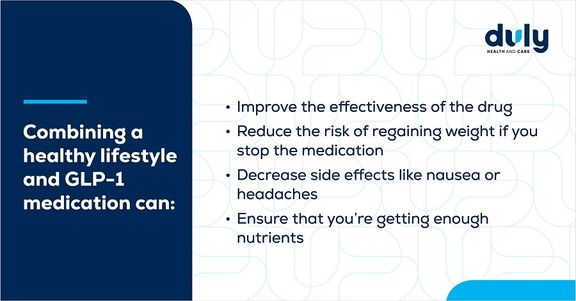Oprah Winfrey and Kelly Clarkson rave about them. Between 2019 and 2023, there was a 400% increase in prescriptions for them. The global market for them is expected to grow to at least $100 billion by 2030.
If you’ve heard of medications like Wegovy® or constantly get that “oh, oh, Ozempic®!” commercial stuck in your head, you already know: the GLP‑1 medication era is in full swing.
These medications, called GLP‑1 antigens, mimic the naturally occurring glucagon-like peptide 1 (GLP‑1) hormone. The hormone plays a critical role in regulating blood sugar levels and is involved in appetite and digestion.
Using GLP‑1 medication, especially to lose weight, has been all the buzz – but not everything that people buzz about is true. Here’s the truth behind some of the common myths about GLP‑1 medications for weight loss.
MYTH: GLP‑1 Medications Are Just Weight Loss Drugs.
FACT: Since GLP‑1 agonists also decrease hunger and food intake, they can help people lose weight. But they were first developed to treat type 2 diabetes. GLP‑1 drugs cause your body to make extra insulin after you eat, which helps lower blood sugar.
GLP‑1 medications have other benefits, as well. They can help:
- Improve lipid disorders and fatty liver disease
- Lower blood pressure
- Reduce the risk of kidney and heart disease
- Delay the progression of a diabetes complication called diabetes-related nephropathy
Most of these drugs are given through injections, but there is one that comes in pill form.
Also read: 5 Diabetes Myths — Debunked
MYTH: All Prescription Weight Loss Medications Are the Same.
FACT: Currently (as of March 2025), there are 10 GLP‑1 medications approved by the U.S. Food and Drug Administration (FDA).
There is some overlap, but they all affect your body a little differently. They also don’t all have the same treatment goals. For example, drugs like Mounjaro® and Ozempic treat type 2 diabetes, while ones like Wegovy and Zepbound® treat overweight and obesity in people with comorbid conditions like high blood pressure.
Also read: How Obesity Impacts Your Health
MYTH: Anyone Who Wants to Lose Weight Should Take a GLP‑1 Agonist.
FACT: Whether or not you should take a GLP‑1 drug depends on many factors, including your current health and medical history. They are not recommended if you:
- Are pregnant or breastfeeding
- Are trying to get pregnant
- Have a personal or family history of medullary thyroid cancer or multiple endocrine neoplasia
Also, GLP‑1 drugs are not designed for people who are just hoping to lose a few pounds for cosmetic purposes.
MYTH: Insurance Doesn’t Cover GLP‑1 Drugs.
FACT: Some insurance companies do cover them, but navigating coverage can be a little tricky. In many cases, the drugs are only covered if you have type 2 diabetes.
For weight management, being overweight alone isn’t always enough for insurance companies to cover GLP‑1 drugs. They may only cover it if you also have an obesity-related condition, like high cholesterol or high blood pressure.
You might also have to jump through a few hoops. Many plans require prior authorization, which is when your provider submits information about why you need the medication, and the insurer will decide if they will cover it. Your insurer could also require step therapy, where you try other weight loss methods first.
It may be a hassle, but don’t let it stop you from considering GLP‑1 drugs if you need them. If it’s right for you, it’s possible to get coverage. And if you decide to pay out of pocket, there are coupons to make medications a little more affordable.
MYTH: GLP‑1 Drugs Are the Easy Way Out.
FACT: No matter how hard someone tries or how many lifestyle changes they make, there are factors like genetics or medical conditions that can make losing weight very difficult. In these cases, GLP‑1 medications can be a game changer.
And remember – obesity is a disease. Just like bariatric surgery, GLP‑1 drugs are medical treatments rather than cosmetic ones.
MYTH: If You Take a GLP‑1 Medication, That’s All You Need to Do.
FACT: GLP‑1 drugs might be key for helping people manage diabetes or lose weight, but they are not magical. Maintaining a healthy diet and getting plenty of physical activity is still important.
Ready to explore if GLP‑1 medications could be right for you? These breakthrough treatments are helping thousands of people achieve their health goals, from better blood sugar control to meaningful weight loss.
Your Duly Health and Care primary care provider can walk you through your options and help you understand if GLP-1s fit into your health journey.
If you’re looking specifically for weight management support, our obesity medicine physicians are here to create a personalized plan that works for your lifestyle.
Take the first step toward feeling your best, schedule your appointment with a primary care or obesity medicine provider, and discover what’s possible for your health.

Additionally, get plenty of protein and add strength training or weightlifting to your exercise routine. This can help prevent muscle loss, which sometimes happens when you lose weight.
Also read: Everything You Know About Starting a New Diet is Iffy (Well, Maybe)
MYTH: Once You Hit Your Weight Goal, You Should Stop Taking Your GLP‑1 Drug.
FACT: Stopping a GLP‑1 medication is like stopping any diet. There is a high likelihood of regaining weight. If you start one, know that it’s best to be on it for the long term.
However, if the thought of having to be on something forever scares you, rest assured that it is safe to stop a GLP‑1 drug if you don’t like it. And while regaining weight is likely, it’s not guaranteed. You may be able to keep the weight off or continue losing weight by making certain lifestyle changes or trying a different medication. (Just make sure you only stop taking medication under your provider’s supervision.)
MYTH: Taking Compounded GLP-1s Is a Great Way to Save Money.
FACT: Compounded medications are drugs prepared by specially trained pharmacists. The pharmacists mix, change, or combine ingredients to create a customized medication. Recently, compounded medications have made their way to the GLP‑1 market.
The two common ones are compounded semaglutide and tirzepatide. Pharmacists purchase semaglutide (the active ingredient in Ozempic, Wegovy, and Rybelsus®) or tirzepatide (the active ingredient in Zepbound) and mix their own medications. Some sell them at med spas or on telehealth websites as cheaper alternatives to people who have to pay out of pocket, sometimes at a savings of $1,000 per month.
But if that old saying “if something is too good to be true, it probably isn’t” is ringing in your ears, listen to it. Compounded medications are not FDA-approved, meaning they haven’t been rigorously tested for safety or efficacy. They may also be prescribed at different doses than what’s usually prescribed.
If you’re interested in taking a GLP‑1 drug, make sure to stick with the brand-name medications and get them through your provider rather than from a website. Medications are safest and work best when your provider can supervise and help you use them safely.
Curious if a GLP‑1 medication could help you reach your health goals? Whether you’re managing type 2 diabetes or looking for weight loss support, your primary care or obesity medicine provider can help you find the right path forward.
Let’s talk about what’s possible for your health.
Health Topics:





